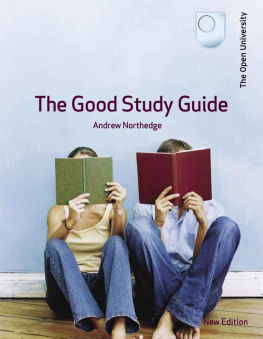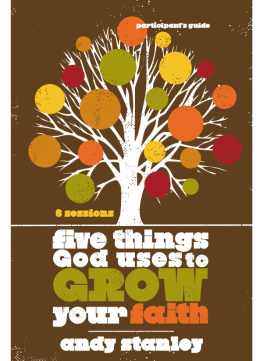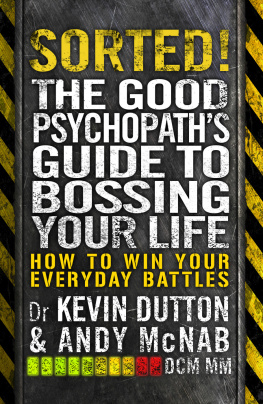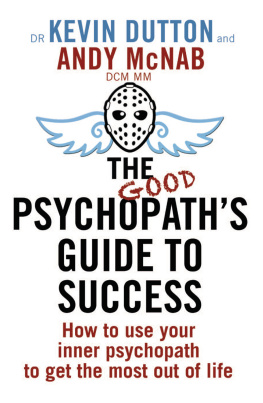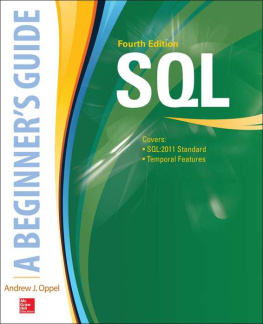Andy Northedge - The Good Study Guide
Here you can read online Andy Northedge - The Good Study Guide full text of the book (entire story) in english for free. Download pdf and epub, get meaning, cover and reviews about this ebook. year: 2005, publisher: Open University Worldwide, genre: Children. Description of the work, (preface) as well as reviews are available. Best literature library LitArk.com created for fans of good reading and offers a wide selection of genres:
Romance novel
Science fiction
Adventure
Detective
Science
History
Home and family
Prose
Art
Politics
Computer
Non-fiction
Religion
Business
Children
Humor
Choose a favorite category and find really read worthwhile books. Enjoy immersion in the world of imagination, feel the emotions of the characters or learn something new for yourself, make an fascinating discovery.
- Book:The Good Study Guide
- Author:
- Publisher:Open University Worldwide
- Genre:
- Year:2005
- Rating:3 / 5
- Favourites:Add to favourites
- Your mark:
- 60
- 1
- 2
- 3
- 4
- 5
The Good Study Guide: summary, description and annotation
We offer to read an annotation, description, summary or preface (depends on what the author of the book "The Good Study Guide" wrote himself). If you haven't found the necessary information about the book — write in the comments, we will try to find it.
The Good Study Guide — read online for free the complete book (whole text) full work
Below is the text of the book, divided by pages. System saving the place of the last page read, allows you to conveniently read the book "The Good Study Guide" online for free, without having to search again every time where you left off. Put a bookmark, and you can go to the page where you finished reading at any time.
Font size:
Interval:
Bookmark:
The Good Study Guide
Author: Andrew Northedge
Project Managers: Penny Bennett, Susan Lowe
Course Manager: Corinne De Souza
Course Co-ordinator: Maureen Richards
Production Team:
Composition: Diane Hopwood
Editor: Kathleen Calder
Design: Vicki McCulloch, Glen Darby
Graphics: Jon Owen
Production Assistants: Elizabeth Rowell-Tinsley, Kathryn Smith, Linda Cambourne-Paynter
Open University Worldwide
This publication forms part of an Open University course K100 Understanding Health and Social Care. Details of this and other Open University courses can be obtained from the Student Registration and Enquiry Service, PO Box 625, Milton Keynes, MK7 6YG, United Kingdom: tel. +44 (0)1908 653231, e-mail general-enquiries@open.ac.uk
Alternatively, you may visit the Open University website at http://www.open.ac.uk where you can learn more about the wide range of courses and packs offered at all levels by The Open University.
To purchase a selection of Open University course materials visit www.ouw.co.uk, or contact Open University Worldwide, Michael Young Building, Walton Hall, Milton Keynes MK7 6AA,United Kingdom for a brochure. tel. +44 (0)1908 858785; fax +44 (0)1908 858787; e-mail
The Open University
Walton Hall, Milton Keynes
MK7 6AA
First published 2005. Reprinted 2005
Copyright 2005 The Open University
All rights reserved. No part of this publication may be reproduced, stored in a retrieval system, transmitted or utilised in any form or by any means, electronic, mechanical, photocopying, recording or otherwise, without written permission from the publisher or a licence from the Copyright Licensing Agency Ltd. Details of such licences (for reprographic reproduction) may be obtained from the Copyright Licensing Agency Ltd of 90 Tottenham Court Road, London W1T 4LP.
Open University course materials may also be made available in electronic formats for use by students of the University. All rights, including copyright and related rights and database rights, in electronic course materials and their contents are owned by or licensed to The Open University, or otherwise used by The Open University as permitted by applicable law.
In using electronic course materials and their contents you agree that your use will be solely for the purposes of following an Open University course of study or otherwise as licensed by The Open University or its assigns.
Except as permitted above you undertake not to copy, store in any medium (including electronic storage or use in a website), distribute, transmit or re-transmit, broadcast, modify or of The Open University or in accordance with the Copyright, Designs and Patents Act 1988.
Edited and designed by The Open University.
Kindle version created by Open University Worldwide/RTH.
This second edition of The Good Study Guide is much more than an update of the original. The whole book has been rethought and substantially rewritten. Piecemeal updating was never an option, given the book's use of integrated examples and the critical importance of coherence in the advice. Since nothing less than a complete overhaul was feasible, I have taken the opportunity not only to bring the book up to date, fifteen years on, but to strengthen it and widen its relevance.
The Good Study Guide retains its primary purpose as a guide for students with a serious interest in long-term development of their learning and study skills. It is not a source of quick fixes and instant remedies. It assumes a willingness to invest time in working on exercises and reflecting on them. It is a thoughtful, theoretically grounded, exploration of the nature of studying and, at the same time, a practical guide to reflective experimentation with techniques, drawing as it does on many years of exploring skills with students.
The first edition of The Good Study Guide reached an audience far broader than the part-time, adult, distance-learning students for whom it was written. Consequently, this new edition has been recast to address the needs of all students aspiring to study beyond school-level. It has also been restructured to reflect the sweeping changes in university study over a decade and a half. Thus it now has five more chapters than before and has been organised into two parts. So, with the updating of case material and consequent reworking of all the study exercises, this is a long way towards being a new book. However, the basic strategy and underlying assumptions about the nature of learning remain.
The first part of The Good Study Guide addresses the broad strategic aspects of successful study and consists of four new chapters. Three of these address one of the key changes of the past decade, the relocating of study skills from their former status on the periphery as 'remedial' activities for beginners, to the mainstream under the new marque 'learning skills'. Developing skills as a learner is now recognised as essential preparation for life in the twenty-first century. This is reflected in the title of Chapter 1: 'Investing in yourself'. These skills are not simply practical, but also strategic, requiring a capacity for self-management; hence Chapter 2: 'Taking control of your studies'. They are also 'reflective' skills, which depend on self-knowledge, self-analysis and an understanding of the learning process; thus Chapter 4: 'Understanding how you learn'. This chapter includes an introduction to the principles of critical-analytical reading and writing, reflecting growing recognition of the importance of supported entry into academic discourse for an increasingly diverse student body.
The other key change of recent times is the revolution in study practices brought about by computing and the internet. This is addressed in Chapter 3: 'Using a computer to study'. Students are often aware of only a few of the many ways they could use a computer to support their studies. This chapter, influenced by my own experiences of designing and teaching online courses, encourages students to explore and experiment. Meanwhile, the rest of the book has been reworked to reflect changes to basic study activities brought about by word-processing, global access to online information, electronic information storage, and the like. And The Good Study Guide is now accompanied by a website to which students are directed for resources.
The second part gets down to the practical business of developing skills in the core activities of studying. As in the original edition, readers are asked to undertake genuine study activities, most of them based around a single text. Though the former article on the growth of shopping centres remains remarkably relevant, it has been replaced by a new one: 'The Secrets of Happiness' by Richard Layard (2003). Generally the content of the original chapters remains, however, 'Making notes' has been separated off from 'Reading', to give it wider relevance and to allow exploration of electronic note making. Also, the chapter formerly titled 'Other modes of learning' has been recast under the title 'Learning through talk', with extensive new material on group discussions and making presentations. In 'Working with numbers and charts', as well as updating the data, students are introduced to online data sources. Then there is a new chapter, 'Researching online', introducing the basics of searching for online resources.
The two chapters on writing remain the longest and perhaps the most important, since the acquisition of an academic writing voice and the ability to assemble material and present it in the form of an argument is in many ways the culmination of the transition into competent academic practice. Retitled, as 'Writing the way 'they' want' and 'Managing the writing process', they retain the same broad division into the 'what' and 'how' of academic writing. However, the first has been completely reorganised to make the treatment more transparent and accessible. Both take advantage of resources on the Good Study Guide website (www.goodstudyguide.co.uk), to simplify exercises that were previously rather cumbersome. The final chapter, 'Preparing for an exam', is the least changed, though again there is reworking.
Font size:
Interval:
Bookmark:
Similar books «The Good Study Guide»
Look at similar books to The Good Study Guide. We have selected literature similar in name and meaning in the hope of providing readers with more options to find new, interesting, not yet read works.
Discussion, reviews of the book The Good Study Guide and just readers' own opinions. Leave your comments, write what you think about the work, its meaning or the main characters. Specify what exactly you liked and what you didn't like, and why you think so.

